Dead Joker Read online
Page 14
33
A glue sniffer crawled along Akersgata. His knees had been ruined by fifteen years of solvent abuse and he had acquired a rocking, seesaw gait. Evald Bromo was aware of the stench of paint thinners before he caught sight of the guy and he averted his gaze in a sudden wave of nausea.
“Give me a tenner,” the man slurred, holding out a skinny, grimy hand. “Only ten kroner!”
Evald Bromo had no desire to stop. But from experience he knew that the best way to get rid of the guy was to pay up. He slowed down and used his right hand to rummage for small change in his trouser pocket. He found a twenty-kroner piece and stared at it for a second before shaking his head faintly as he handed it to the foul-smelling man. The gift obviously took the beggar by surprise. He dropped the coin and stood swaying irresolutely from side to side, as if he did not quite know what had become of the money. Annoyed, Evald Bromo hunkered down to help. Perhaps he gave the impression that he was going to take the donation back; anyway, the beggar hurriedly made a grab for it. The two men’s heads clashed and Evald Bromo fell to the ground. The man made a fuss and insisted on helping Bromo back onto his feet. Bromo preferred to manage by himself. It ended with both men lying in floundering confusion directly outside Aftenposten’s main entrance.
Aftenposten’s Chief Editor rounded the corner beside the Apotek Kronen pharmacy and dashed recklessly across Akersgata, past three vehicles waiting for a green light. When she passed the main entrance of the Dagbladet newspaper office, she saw that it was Evald Bromo who was spreadeagled on the sidewalk with the most troublesome of all the local beggars on top of him. She immediately assumed that the journalist was being attacked. In a fury, she thumped the glue sniffer on the back with her umbrella, then stormed into her own newspaper’s reception and ordered someone to phone the police right away. After that she darted out again.
Evald Bromo was now alone, leaning on a pillar, brushing dirt and grit from his clothes. He mumbled something incomprehensible that it would be difficult to interpret as anything other than a refusal when the Chief Editor insisted on taking him to see a doctor.
“It wasn’t an assault,” he finally managed to enunciate. “It was just an accident. I’m not injured. Thanks.”
The Chief Editor peered at him suspiciously. In a sudden glimmer, she thought of the peculiar, anonymous email.
“Is everything okay, Evald?”
She placed her hand on his lower arm and he stared as though bewitched at the long, red-lacquered talons sinking into the rough tweed of his jacket sleeve. He wanted to shake himself free, but swallowed and forced a smile and a reassurance. “Everything’s fine. Honestly.”
“Everything else as well? Nothing bothering you at the moment?”
“No,” he said, aware that he sounded rather brusque. “I’m absolutely fine, thanks.”
“Well, well,” the editor said with an encouraging smile, “we have a newspaper to produce, Evald. See you later.”
She disappeared into the building, majestic and poised, hugging her satisfaction to her chest like a hot-water bottle. She prided herself on taking her colleagues’ welfare seriously. No one could say that she had not done her best as far as Evald Bromo was concerned. She did not even notice whether he followed her into the vast newspaper building. But then she encountered the Finance Minister on her way to the elevator.
34
It was nearly half past four when Hanne Wilhelmsen returned from the hospital. It had taken her fifteen minutes in front of the mirror in the restroom to make her face presentable, so that the redness around her eyes could be taken as the symptoms of a heavy spring cold. She spread pale-brown foundation over her cheeks to disguise the worst of the blemishes and drew a dark red lipstick over her lips. She had to get her hair cut soon. When she would have the time and energy was impossible to predict.
“That was a long two or three hours,” Karianne Holbeck said, with a mixture of reproach and curiosity, as her eyes took the measure of Hanne.
Nine detectives with CID Chief Jan Sørlie in tow sloped out of the cramped conference room. The stale smell of confined humans that enveloped them hit Hanne like a brick wall as she entered the room to take a cola from the refrigerator.
“Sorry,” Hanne mumbled to her boss as they passed each other. “Pressing engagement of a personal nature.”
He did not say a word, but shot her a look that told her Billy T. – or perhaps that damned persistent Police Chief – had spilled the beans. Sørlie’s eyes were filled with impotent sympathy, and Hanne averted her gaze as she needlessly closed the door behind her.
Billy T. tore it open again.
“Now I’ve got you.”
He smiled faintly and sat on the chair at the end of the table. Hanne took forever to find the cola she had put there three days earlier. Finally, she could string it out no longer. She had found it ages ago.
“Would you like a summary?” Billy T. asked when Hanne finally drew back and closed the fridge door. “Some kind of picture is beginning to emerge now.”
He let his finger outline an invisible pattern on the tabletop, as if he meant what he said quite literally.
“You can also have a chat,” he continued in an undertone. “Or a hug.”
He spread his palms in front of him and examined the backs of his hands while chewing his bottom lip. When Hanne still said nothing, but instead simply stood there indolently with the bottle in her hand and her gaze fixed on a spot half a meter above Billy T.’s head, he pressed on. “We could go for another walk. The air in here must be hazardous to our teeth. It feels caustic.”
He ventured a smile.
“A walk would be a good idea,” she answered surprisingly fast. “I’d quite like to take a closer look at Staure Bridge. How long does it take to get there?”
“No idea,” Billy T. said and got to his feet. “But I’ve all the time in the world. Half an hour, perhaps? Let’s go!”
He extended his hand as she edged round the table and passed him. She did not take it. Outside the door, Karianne Holbeck stood waiting.
“I’ve something I must—”
“It’ll have to wait,” Hanne interrupted. “Can we talk about it tomorrow?”
“No, I’m afraid I’ve made a mistake and—”
Hanne glanced at the clock before sighing heavily, at the same time aware she was stinking worse than ever. With her arms clamped against her body in embarrassment and the forlorn hope that she could contain some of the foul odor, she gestured to Karianne to follow her.
“We’ll meet up in half an hour,” she said to Billy T..
Despite the outside temperature having dropped to seven degrees Celsius, Hanne threw her office window wide before offering Karianne Holbeck a chocolate banana from the enamel dish she had received from Cecilie on their twentieth anniversary.
“What’s it about?” she asked, reclining as far back in her chair as possible.
Karianne Holbeck told her about her conversation with the man whose name she did not know but who she thought was Turkish and might own a shop in Grünerløkka. She cast her eyes down self-consciously as she summarized her potentially catastrophic error: the man might have information regarding Halvorsrud’s corruption, but Karianne Holbeck had neglected to note the guy’s name and address. Unfortunately. Apologies.
Hanne Wilhelmsen did not utter a word for ages. It started to feel very cold in the room, and she reluctantly closed the window and resumed her seat. Then she urged another chocolate banana on her colleague. Karianne Holbeck accepted, but sat fiddling with it until the chocolate melted and, obviously embarrassed, she had to lick her fingers.
“I must give you credit for reporting this,” Hanne began; her voice was strangely monotone, as though forcing out a sentence learned by heart. “It probably doesn’t matter. He’s coming on Monday, isn’t he? Are you sure he caught your name?”
“Fairly sure,” Karianne Holbeck said, relieved. “But God only knows whether he’ll turn up. He didn’t sound ter
ribly reliable.”
“Oh no?” Hanne said, raising her eyebrows almost imperceptibly. “What do you mean by that? Can you tell from someone’s voice whether or not they’re reliable?”
“Well …” Karianne said, squirming slightly.
Hanne noticed that her colleague had an odd habit of tossing her hair over her shoulder. The gesture was attractively feminine, but also brought to mind a little girl disclaiming all responsibility.
“I don’t quite know now,” Karianne continued. “In my experience, people from those parts don’t have the same notion of what constitutes an appointment as we do. It’s as if time doesn’t mean the same to them.”
Hanne Wilhelmsen could not care less that she smelled like a down-and-out. She interlaced her fingers at the nape of her neck, projecting her elbows out in the air like wings, and studied her colleague through her long fringe. Then she pursed and smacked her lips before saying, “And who do you mean by ‘we’?”
“What?”
“Who are ‘we’? We who do understand the principles of a specific time of day?”
“Nooo—”
“And what are ‘those parts’? Turkey? Asia Minor? The Third World?”
“I didn’t mean it like that,” Karianne said, rubbing a red mark on her cheek that was growing dangerously fast. “I just meant …”
She did not continue. Hanne Wilhelmsen waited.
“It was a stupid thing to say,” Karianne said, tossing her hair. “Sorry. It wasn’t meant nastily.”
Hanne let go of her neck and leaned forward. Picking up a pen, she began to draw circles and trapezoids on an invitation to a union meeting. She took her time. The circles were big and small, and they intersected the trapezoids in a number of small, enclosed spaces that she neatly colored with blue and red felt-tip pens.
“I don’t believe it was either,” Hanne said so suddenly that Karianne literally jumped in her seat. “I don’t believe you meant anything nasty by what you said. Nevertheless, I think …” She tapped a brisk drumroll with the two felt-tip pens on her blotter. “… you should consider what you stand for. What kind of prejudices you’re struggling against. Have you noticed the man who cleans downstairs in the foyer every morning? The guy who always wears a shell suit in Swedish colors?”
Karianne shook her head gently. By now the redness had spread into a belt across the bridge of her nose, and she resembled a quite defenseless human raccoon.
“Maybe not. You should take the time some day. Come in early and talk to the guy. He’s from Eritrea. He’s a veterinarian. His Norwegian’s not bad. But after four years in an Ethiopian prison, his nerves are not so good.”
“I’ve said I’m sorry,” Karianne Holbeck said, now almost defiant.
“We’ll take the risk that our friend from Grünerløkka will turn up. In fact I think I’d like to talk to him myself. Did he phone the central switchboard or the operations center?”
“Eh?”
“112,” Hanne said, rubbing her eyes without any thought for her newly applied mascara. “If he called the emergency number, then the conversation is on tape. If not, we’ll have to hope that he knows what an appointment means. Check that out, please. And let me know when he arrives.”
Karianne Holbeck nodded and stood up.
“Here, have another chocolate!”
Hanne held out the dish to her colleague, but Karianne did not even say no thanks. Instead she gave the door a rather hard and quite unnecessary slam.
35
They drove in Hanne Wilhelmsen’s own car. The seven-year-old white BMW had one red fender. Cecilie had crashed it the previous autumn, four days after Hanne had cancelled the comprehensive insurance policy.
“Can’t we just agree not to talk about Cecilie?” Hanne said quietly, switching the windscreen wipers to the fastest setting. “It would be great if you could accept that I don’t want … Not yet, at least. Visit her yourself, please do. She’d be delighted.”
Billy T. struggled to push the passenger seat further back. The lever at the front of the seat was awkward, and suddenly he was left holding the entire thing in his hand.
“Shit!”
He stared from the lever to Hanne and back again. She looked quickly at the damage, shrugged and used her thumb to point at the rear seat. Billy T. chucked the metal lever over his shoulder, then fastened his seatbelt.
It was late afternoon and the last of the daylight was being snuffed out by the rain-soaked asphalt. The road had narrowed and there were no streetlamps any more. Hanne reduced her speed when she sensed the car almost aquaplaning on one of the bends.
They drove in silence.
Billy T. tracked the bluish-gray landscape with his eyes. The fields were ploughed for spring and a pungent odor of manure tickled his nostrils and made him think of his sons. He had arranged to take them on a farm holiday this year. The boys and Billy T., Tone-Marit and their new baby girl, were all going to western Norway to his cousin’s smallholding. A fortnight. Only after it was all settled did it strike Billy T. that a holiday with relatives and four lively stepchildren might not fulfill Tone-Marit’s dreams of a romantic honeymoon. But she had merely smiled when, filled with regret, he had asked if she would rather do something else. She was looking forward to it, she claimed. He had chosen to believe her.
The thought of their newborn child made him smile.
A fox scurried across the road.
Hanne immediately applied the brakes, but took her foot off the pedal just in time to avoid losing control of the vehicle. Then she slowed down some more and they swung round the bend where the fields suddenly opened out to the sea. The span of Staure Bridge towered majestically between the mainland and the peninsula eight hundred meters across the fjord.
They parked on a gravel area one minute’s walk from the bridgehead. Hanne glanced briefly at the papers she had stuffed down between the seat and the center console. This was where they had found Ståle Salvesen’s old Honda. Now the place was deserted. A garbage bin had been knocked over by the wind. A badger or perhaps just a roaming dog had hauled out the garbage; she could detect a hint of decay even in the fresh tang of the sea air.
“Strange that they don’t clear up that sort of thing,” she said absent-mindedly as she locked the car.
“Thirty-five minutes,” Billy T. roared. He had walked ahead of her and his voice was almost drowned out by the racket the sea made as it beat against the large pebbles.
“What?” she shouted back.
“It took us thirty-five minutes from the police station,” he explained when she caught up with him. “Marvelous that something like this can be found so close to the city.”
Staure Bridge was pretty narrow. Two cars could pass easily in the middle, but it would be tight if one was a truck. On the southern side – facing the sea – ran a narrow corridor-like path for pedestrians, separate from the vehicle lanes. Probably it had been added later. Hanne began to jog across the bridge. It was steep, and she came to a breathless halt after a couple of hundred meters. Billy T. ambled along after her.
“What are we looking for?” he asked, resisting the temptation to brush her hair back from her face; the breeze from the fjord was strong and he felt a faint movement in the actual structure of the bridge below his feet.
“Nothing and everything,” she said, continuing on up.
They had reached the top.
Billy T. felt uncomfortable.
“Bloody hell,” he muttered, only just daring to peep out over the railings. “Things would have to be fucking awful to think of jumping off here.”
Hanne nodded faintly. She leaned over as far as possible. The water was nothing but a gray-white churning in a black void down below. If she had not already known that it was a twenty-meter drop, it would have been impossible to estimate. There was nothing to measure it against – nothing to create a realistic impression of height and distance.
“Hold me,” Hanne said, beginning to clamber over the railings.
&
nbsp; “Are you out of your mind, girl?” Billy T. tugged at Hanne’s upper arms in an effort to drag her back again.
“Ouch!” Hanne yelled. “That’s sore! It’s dangerous! Hold me by the shoulders, but not so hard!”
Billy T. reluctantly loosened his grasp then took hold of her again, this time by the roomy shoulders of her pilot jacket. He felt his pulse hammering in his eardrums and found it difficult to draw breath. Hanne was hanging onto the railings but he could not see what she was searching for with her feet.
“What the fuck are you trying to do?” he snarled, feeling a surge of adrenalin through his limbs when he thought for a moment he had lost his grip.
“I want …” Hanne groaned, bending so far down that he had to let go to avoid causing a calamity. “I want to find out if there’s a way back to the mainland.”
The rest was lost. Hanne was gone. Billy T.’s fear of heights was superseded by an even greater anxiety: Hanne had fallen into the sea. She had totally vanished. In desperation, he leaned over the railings, trying in vain to catch sight of something other than the gray crests of foam far, far below.
“Hanne! Hanne!”
He screamed her name time after time as he searched desperately through his pockets for his cell phone.
“Damn and blast!”
He had left it behind in the car.
“It’s possible,” he heard someone say.
Hanne’s head appeared above the railings. She put her hands on the iron ledge and rolled herself over the edge. Then she smiled as she looked him in the eye.
“It’s possible,” she repeated. “The substructure of the bridge allows you to climb over the railings and give the impression that you’re throwing yourself into the water. Then you can walk along the corridor underneath, all the way back to dry land. It would be difficult, I think, but far from impossible.”
“Bitch,” Billy T. hissed.
“I told you that’s what I was doing,” Hanne ventured.
“You know I’m not very fond of heights,” he exploded, forcing his way past her.
The massive expanse of his back swayed in front of her all the way down to the shore again. Billy T. did not say a word, and nor did he allow her to walk by his side for the short distance from the bridgehead across to the car. Every time she tried, he accelerated his pace. But she was the one who had the car keys.

 A Grave for Two
A Grave for Two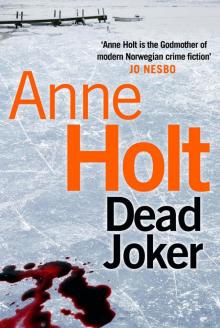 Dead Joker
Dead Joker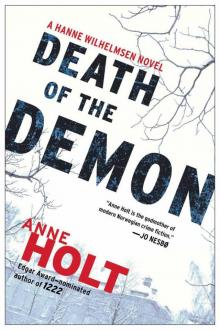 Death of the Demon: A Hanne Wilhelmsen Novel
Death of the Demon: A Hanne Wilhelmsen Novel Punishment aka What Is Mine
Punishment aka What Is Mine Beyond the Truth
Beyond the Truth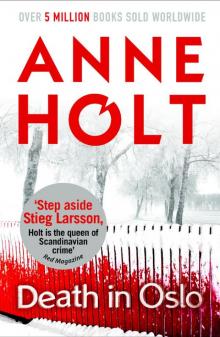 Death in Oslo
Death in Oslo The Blind Goddess
The Blind Goddess What Never Happens
What Never Happens 1222
1222 In Dust and Ashes
In Dust and Ashes Odd Numbers
Odd Numbers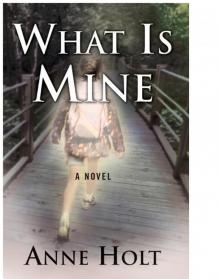 What is Mine
What is Mine What Dark Clouds Hide
What Dark Clouds Hide Blessed Are Those Who Thirst
Blessed Are Those Who Thirst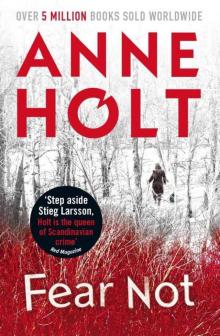 Fear Not
Fear Not No Echo
No Echo Hanne Wilhelmsen - 01 - The Blind Goddess
Hanne Wilhelmsen - 01 - The Blind Goddess